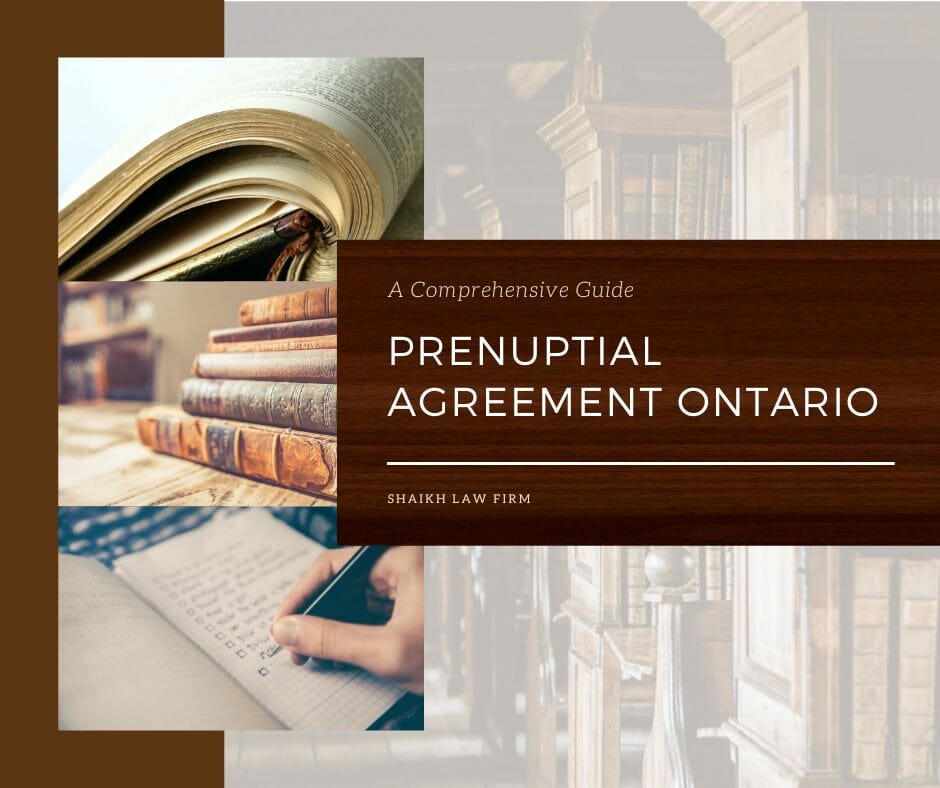In the realm of marriage and relationships, few topics are as misunderstood or as sensitive as the prenuptial agreement in Ontario. Often seen as a harbinger of mistrust or an omen of marital doom, prenuptial agreements, or “prenups” as they are commonly known, are, in fact, practical legal tools that can provide clarity, security, and peace of mind for couples planning to tie the knot.
In Ontario, as in many jurisdictions worldwide, prenuptial agreements are recognized and enforced by law. They serve as a means for couples to establish their financial rights and responsibilities towards each other, both during the marriage and in the event of a divorce. While discussing prenuptial agreements may not be as romantic as planning a honeymoon, it is an essential conversation that can help prevent future disputes and misunderstandings, as well as understand the prenuptial agreement Ontario cost.


A prenuptial agreement, or prenup, is a legal contract made by a couple before marriage that outlines how their assets, debts, and property will be divided if the marriage ends due to separation, divorce, or death. A prenup typically addresses property division and spousal support, helping to clarify financial responsibilities and protect both parties’ interests.
In Ontario, prenuptial agreements are legally recognized as Marriage Contracts under the Family Law Act, and they are enforceable if properly executed.
In Ontario, prenuptial agreements are formally known as “Marriage Contracts” under the Family Law Act. These legally binding agreements can be signed before or after marriage to set out how a couple intends to handle property division, spousal support, and other financial matters in the event of separation, divorce, or death.
While the term “prenup” typically refers to a Marriage Contract made before marriage, the same type of agreement signed after marriage is often called a postnuptial agreement. Regardless of when it is signed, the legal effect is the same — couples can contract out of Ontario’s default family property laws and establish their own financial rules.
Marriage Contracts provide certainty and clarity, particularly in second marriages, blended families, or where one spouse owns significant property or a business. They are enforceable when properly drafted, with full financial disclosure and independent legal advice.
A cohabitation agreement is a legal document for couples who live together but aren’t married. Essentially it is a prenup or postnup for common law partners. It explains how their assets and debts will be handled if they separate. It can also cover spousal support (alimony) arrangements.
Yes, prenuptial agreements are legally binding in Canada, but only if they are done correctly. At Shaikh Law Firm, we ensure your agreement meets all legal requirements so it holds up in court and gives you lasting peace of mind.
What Makes a Prenup Legally Enforceable in Ontario:

A prenuptial agreement, also known as a marriage contract, allows you and your partner to make clear, fair decisions about finances and property before entering into marriage. A prenup essentially addresses two key legal issues: spousal support and the ownership and division of property. In more detail, it may include
Every couple’s situation is unique. We’ll work with you to ensure your agreement reflects your values, your goals, and the future you’re building together
While prenuptial agreements offer significant flexibility, there are certain provisions that are not permissible or enforceable under the law. These include:
Creating a prenuptial agreement requires careful consideration and a balanced approach to ensure it is fair, reasonable, and legally enforceable. Consulting with a knowledgeable prenup lawyer in Toronto can help ensure that your prenup protects your interests while adhering to legal standards and ethical considerations.

Prenuptial agreement costs in Ontario range from $750 to $3,600, depending on the complexity and the services provided by the lawyer. Basic agreements priced at $750 typically do not include detailed financial statements. At our firm, a prenuptial agreement costs $1,980 + HST, which consists of all necessary documents, including financial statements and services that could cost up to $3,000 plus tax at other law firms. We offer a cost-effective solution compared to other law firms, offering not only cost-effectiveness but also significant protection against potential litigation costs, which can escalate from $10,000 to $90,000 + HST.

A prenuptial agreement, often referred to as a prenup, is a contract agreed upon before marriage that outlines how assets and debts will be divided in the event of a separation or divorce.
Although discussing such matters can seem unromantic, a well-crafted prenup can actually strengthen your relationship by fostering open communication and preventing future disputes.
Our team of dedicated Prenuptial agreement lawyers in Toronto at Shaikh Law Firm are here to guide you through the process, ensuring that your prenup agreement is fair, legally binding, and reflective of your unique circumstances.
Our in-depth knowledge of the complex legal landscape and our empathetic approach will help you navigate this journey with confidence.
A prenuptial agreement should ideally be signed at least 3 to 4 months before the wedding. This timeframe allows both partners ample opportunity to review the agreement, seek independent legal advice, and make any necessary adjustments without the pressure of impending wedding plans. A prenuptial agreement formalized closer to marriage is susceptible to being set aside by courts on the grounds that the parties were pressured.
An unconscionable prenup can be set aside under certain conditions, typically when it fails to meet legal standards or when circumstances surrounding its creation or terms are deemed unfair or improper. Key reasons include:
Courts scrutinize prenups to ensure they were entered into freely, with full knowledge, and without unfair advantage to one party.
Prenuptial agreements are often misunderstood, leading to several misconceptions that can deter couples from considering one.
Here are some common misconceptions and the truths behind them:
Only for the Wealthy: Many believe that prenuptial agreements are only for the wealthy. While they are important for protecting significant assets, prenuptial agreements can benefit anyone by clarifying financial expectations and responsibilities.
Prenups Predict Divorce: Another common misconception is that getting a prenuptial agreement means predicting or planning for your marriage to fail. In reality, a prenuptial agreement is a practical tool for preparing for any possibility, much like insurance. It doesn’t mean you expect a divorce any more than having car insurance means you desire a car accident.
Prenups are Unromantic: While it’s true that discussing financial matters can seem unromantic, it’s also a crucial part of building a life together. A prenuptial agreement encourages open and honest communication about finances, which can strengthen your relationship.
Prenups are One-Sided: Some people believe that prenuptial agreements only protect the wealthier spouse. However, a well-drafted prenuptial agreement should be fair and protect both parties. A prenuptial agreement favouring one party over the other may not be upheld in court.
Prenups are Set in Stone: Many people think that once a prenuptial agreement is signed, it cannot be changed. However, prenuptial agreements can be amended or revoked at any time as long as both parties agree.
Understanding these misconceptions can help you decide whether a prenuptial agreement is suitable for you. If you have any questions or concerns, a prenuptial agreement lawyer in Toronto can provide expert advice tailored to your unique situation.
Saving money by using an online prenuptial agreement template might seem tempting. However, the risks involved can outweigh the initial savings. A poorly crafted agreement could end up costing you significantly more in the long run.
Online templates come with hidden pitfalls. Even if you use one, both parties still need Independent Legal Advice (ILA) from a lawyer. This requirement alone can offset any cost benefits. Moreover, if your agreement doesn’t comply with the law, a judge has the authority to invalidate it.
Consulting a family lawyer for your prenuptial agreement in Toronto is crucial. They can provide tailored advice that a generic online template can’t offer. A qualified lawyer ensures that your agreement is legally sound and adheres to all relevant laws, reducing the risk of it being dismissed by a court.
In summary, while an online template may seem like a quick and cheap solution, the potential legal complications make it a risky choice. For peace of mind and a legally secure agreement, it’s advisable to consult a professional.
In Ontario, a properly drafted and executed prenuptial agreement is enforceable in court. However, it can be challenged on various grounds, such as non-disclosure of financials such as assets, undue influence, or unfair terms. That’s why it’s crucial to seek the help of a knowledgeable lawyer when creating a prenuptial agreement. It is common for Ontario Courts to overturn templates signed by parties since they lack basic principles and requirements of the Family Law Act.
Can a prenuptial agreement be amended or revoked?
Yes, a prenuptial agreement can be amended or revoked after marriage, but both parties must sign any changes or revocation in writing. It is best to speak to a prenuptial Agreement lawyer in Toronto to help with any changes to the Agreement.
How long does it take to create a prenuptial agreement?
The time it takes to create a prenuptial agreement depends on several factors, including the complexity of the couple’s financial circumstances and how quickly the couple can reach an agreement on the terms. Our team at SHAIKH LAW FIRM works diligently to ensure a timely process. At Shaikh Law, it takes around three to four days to prepare a prenuptial Agreement from the date all documents are provided to the Lawyer.
Can a lawyer represent both parties in a prenuptial agreement?
NO !! It is highly recommended that each party in a prenuptial agreement has their own legal counsel. This ensures that both parties fully understand the agreement and that it is fair and balanced.
How can SHAIKH LAW FIRM help me with my prenuptial agreement?
At SHAIKH LAW FIRM, our experienced lawyers can guide you through every step of the process, from drafting and reviewing the agreement to providing representation if disputes arise. We offer a personalized approach, ensuring that your agreement is tailored to your unique circumstances and protects your interests.
What Happens If You Sign A Prenup And Get Divorced?
If a marriage ends in divorce, the prenuptial agreement serves as a guide for the distribution of assets and other financial matters. LEARN MORE.
What Should A Woman Ask For In A Prenup?
As a woman, it’s crucial to know what to ask for in a prenup to protect your rights and secure your future. Key considerations include property rights, spousal support, retirement benefits, and much more. However, every situation is unique and requires careful deliberation. LEARN MORE.
Why Cheap Online Templates Are a Risky Business?
Cost-effective and seemingly convenient, cheap online prenuptial agreement templates can pose significant risks. These generic forms often fail to account for unique circumstances, individual state laws, or recent changes in legislation. Moreover, they can omit crucial clauses and lack the detailed precision needed in such agreements, potentially resulting in legal disputes or an unenforceable prenup. Hence, professional legal guidance is always recommended to ensure a thorough, fair, and binding prenuptial agreement. At our law firm a Prenuptial agreement in Ontario costs $1980 +HST which includes all financial disclosures, unlike other law offices where a prenuptial agreement cost over $3,000 + HST.
Prenuptial Agreement Ontario: A Comprehensive Guide
Navigating the intricacies of prenuptial agreements in Ontario can seem daunting. These agreements, pivotal in protecting your assets and rights, must adhere to specific legal frameworks and standards to be enforceable. Understanding the nuances of these agreements in the context of Ontario’s laws is crucial to crafting a valid and fair prenup. To learn more, delve into our comprehensive guide on Prenuptial Agreement Ontario. Also, visit our page about 9 Tips you must know about prenuptial agreements in Canada.
Remember, our initial 15-minute consultations are always free, and we’re here to answer any additional questions you might have. Contact us today to get started.
Multiple Meeting Locations
(905) 795 7757
info@slclawyer.ca
(905) 795 7757
City of Toronto & Greater Toronto Area, Ontario
TD Canada Trust Tower, 161 Bay St. 27th Floor, Toronto, ON M5J 2S1
Ph: (905) 795 7757
PH: (647) 812 6938
Fax: (905) 795 1271
E-mail: info@slclawyer.ca